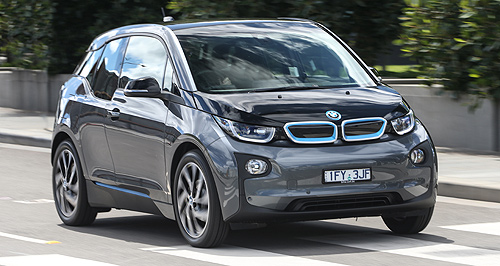Make / Model Search
News - General News - Electric VehiclesElectric Vehicle Council to fight soaring emissionsLarge and in charge: The Electric Vehicle Council is proposing incentives that could cut the cost of electric vehicles by $8000, making the Nissan Leaf (left) a more viable proposition for buyers. Car-makers, energy companies and more join to push viability of EVs in Australia22 May 2017 By NEIL DOWLING THE federal government has been urged to support a move to electric vehicles (EV) in the wake of reports that Australia’s transport sector has one of the worst emission levels of developed countries. The push is being made by a new national committee – dubbed the Electric Vehicle Council (EVC) – comprised of car-makers, energy suppliers, motoring organisations and fleet businesses, who are calling for incentives to boost EV ownership. According to the newly formed group, removing fringe benefit tax from EV ownership could cut the cost of the cars by $8000 each, making them much more competitive compared with petrol- and diesel-powered models. Formed as a response to the federal government’s Vehicle Emissions Discussion Paper, the council – which officially launched today in Canberra – published its own report titled “The Path Forward for Electric Vehicles in Australia” stating that EVs can reduce carbon dioxide (CO2) emissions from vehicle by up to 47 per cent by 2050. Federal minister for energy and environment Josh Frydenberg and minister for urban infrastructure Paul Fletcher attended the Canberra launch event, with other guests including the CEO of energy supplier AGL Andy Vesy and Mitsubishi Motors Australia CEO Mutsuhito Oshikiri. Mr Frydenberg also announced a $390,000 grant from the Australian Renewable Energy Agency (ARENA) to support the uptake of EVs in Australia at the event. ClimateWorks Australia head of implementation Scott Ferraro said the funding from ARENA would support a broader effort to educate and engage Australians about EVs. “Globally, the number of electric vehicles sold annually is growing rapidly,” he said. “However in 2014, electric vehicle sales accounted for just 0.1 per cent of new cars sold in Australia. “This funding will enable us to work with the Electric Vehicle Council to provide more information about electric vehicles to Australian consumers and undertake research on the best policies to drive greater uptake of electric vehicles, particularly at the early stages in order to increase model choice and infrastructure.” He said the EVC would also publish an annual report on electric vehicle use and sales. ClimateWorks CEO Anna Skarbek said “electric vehicles are the solar panels of the automotive industry”. “There is significant opportunity to reduce emissions for the transport sector in Australia,” she said. “With the right support, we could see a rapid uptake that would have positive outcomes to our health, the economy and for consumers.” AGL’s CEO Andy Vesey said: “Electric vehicles will help the Commonwealth government achieve its two degrees target. “In support, AGL has committed to have at least 10 per cent of our fleet vehicles electric by mid-2018 – a figure that can grow as more options become available in the Australian market.” EVC chair Behyad Jafari said the market for electric vehicles includes significant opportunities to deliver economic investment, innovation and environmental sustainability. “While the global industry grows exponentially each year, Australia continues to miss out,” he said. “In the next 12 months, almost one million electric vehicles are projected to be sold, with more than $50 billion invested in the industry over the last 10 years. “In addition to introducing vehicle emission standards, key policy measures include incentivising electric vehicle purchase in the short term as the technology works to meet price parity through upfront incentives and taxation measures, as well as establishing a recommended roadmap for national public charging infrastructure. “We welcome others from across industry, consumer groups and government to join the Electric Vehicle Council as we work to build and provide certainty for investment in the Australian electric vehicle industry.” EV sales, including hybrids, number 810 year-to-date to the end of April. Pure EV sales are up 20 per cent year-on-year while hybrid sales have increased by 14 per cent, despite supply problems with the most popular EV on the market, the Mitsubishi Outlander PHEV. The EVC’s next steps involve a demonstration project to explore the needs of consumers when purchasing, driving and charging electric vehicles and ongoing consultation with manufacturers to deliver more model choice to the Australian market. The EVC members include ActewAGL, AGL Energy, Synergy and TransGrid, as well as automotive manufacturers Audi, BMW, Hyundai, Jaguar Land Rover, Mitsubishi, Nissan, Porsche, Tesla and Volkswagen Group. Infrastructure and fleet businesses such as JET Charge and Lennock Fleet, the not-for-profit ClimateWorks Australia, project engineering firm ITP Renewables and motoring club Royal Automobile Club of Victoria (RACV) also round out the EVC members list.  Read more |
Click to shareGeneral News articlesResearch General News Motor industry news |












Facebook Twitter Instagram